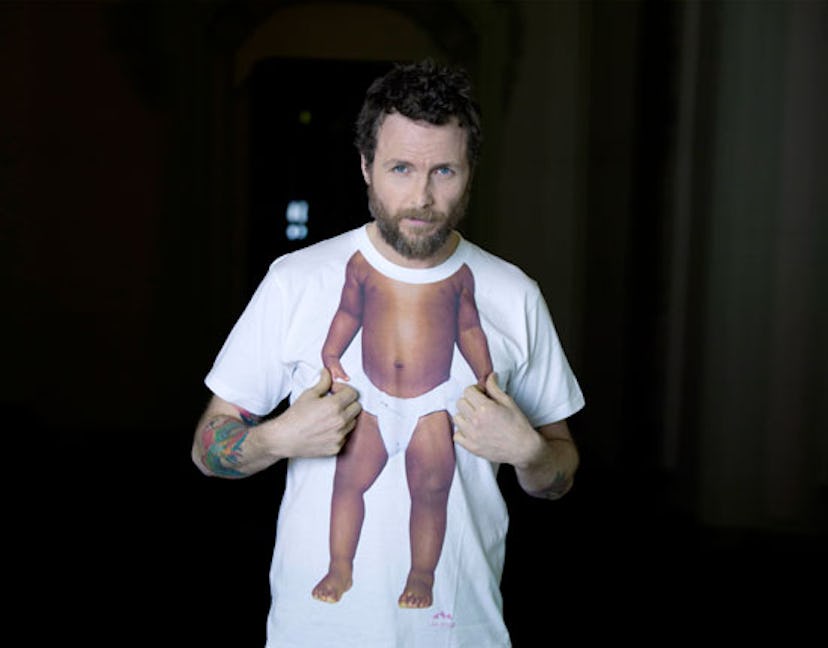Five Minutes With Jovanotti
Lorenzo Cherubini was first introduced to Italian audiences some twenty-five years ago under the stage name "Jovanotti," and has since vaulted to a bona fide super celebrita, turning careers as nimbly as the former-DJ spun...

Lorenzo Cherubini was first introduced to Italian audiences some twenty-five years ago under the stage name “Jovanotti,” and has since vaulted to a bona fide super celebrita, turning careers as nimbly as the former-DJ spun turntables: at 45, he is a record-breaking rocker and rapper, a poet and activist, a father and sell-out performer. And he also has more than 1 million Twitter followers through his handle @lorenzojova; more than any other Italian citizen. Hailing from Tuscany and Rome, the artist picked up a love for American hip-hop in the late eighties, became the first in his country to break through commercially as a rapper, and evolved his sound through the years into an omnivorous mix of rap, classic-rock, ska, funk, and Latin music, leading to a total of eight No. 1 albums and collaborations with artists like Ben Harper, Run DMC, Beastie Boys, and Luciano Pavarotti. Considering Cherubini’s early influences (he learned English through his teenage obsession with American records and films), it seems natural that he is moving to New York this fall to promote Italia 1988-2012, his first stateside 13-song album release through ATO Records.
W spoke with the artist on music and youth, the mystery of music, and his friendship with Bono.
I heard that hip-hop changed your life when you were 15. It was like an epiphany; I was so attracted to music, style, art and graffiti. I had discovered that somebody was finally talking my language, especially when I started listening to the Beastie Boys, Run DMC, Grandmaster Flash, and Public Enemy. It’s what happens when you’re really young; you want to feel different and be part of the new wave. Music helps you do that. It becomes so much more than just music—it helps to create your identity.
People say that bringing rap to the United States is like selling ice to the eskimos. What’s your spin? [Laughing] Yes, it’s like that. But I hope that if you make good enough ice cream, the eskimos will still be interested. I don’t believe that my music can become popular in the United States. What I hope is to find a way to play music in this country, because there are so many people here that are passionate about music.
You’ve performed at stateside music festivals like Bonnaroo, Summer Stage and Outside Lands. When you’re on stage, do you feel a different energy from Americans than the Italians? Yes. [The Americans] look at me like some sort of exotic animal, so I try to be the best exotic animal I can.
Which exotic animal? Like an Italian giraffe. But, even if you don’t understand the meaning of the language, the Italian sound is very recognizable. If you don’t understand the context, the energy is understood. For example, the first 30 years of my life I didn’t understand a word of the American music I was listening to. When I was loving hip-hop, I was loving it without understanding anything. It’s not the most important thing to understand the words.
What do you think is the most important thing? Perhaps it’s the form, or the energy. I think the most important thing is a mystery.
I was watching a clip of one of your San Francisco performances. I liked your line: “I’m grooving like James Brown and I sing like Pavarotti.” It was a good rhyme! And I’m not a liar when I say that. James Brown and Pavarotti are two of my heroes. I knew Pavarotti personally; he was a big life-lover and a lover of all the senses. And I would think, or hope, that James Brown was the same.
Your work as an activist has started to inform your music in the past few years. Well, I use my microphone to amplify something that I feel is right. As a singer, you can either do a commercial for a soft drink, standing by a pool with nice hair, or you can decide not do a commercial for a soft drink but for something you really believe. You can promote your vision of the world.
You’ve campaigned in Africa with your friend Bono, addressing issues like AIDS and foreign debt. Tell me about that experience. It was incredible. Bono is a real maestro—he’s such a serious man, but at the same time he’s a rockstar. And I hope to travel with Bono to Africa again, but with the global economic crisis such an immediate concern in Italy, it’s digressed the attention from faraway countries. I find it interesting that the timing of music and art moves so much faster than that of politics. As an artist, I want to see the effect of what I do now, so working with politics can be frustrating.
Is there anything that surprises you now that you’re older, something you’ve learned along the way? Well, I think about the future now. When you start thinking like that, it means you are not so young anymore. If you ask me, “How old are you?” I have to think three seconds before I answer. I’m 45, but I am also 15, also 20, 25. That’s the good thing about growing up: when you’re 20, you’re just 20. When you’re 30, you’re 20—and 30. So all my best ages, and that good energy, remain with me.
Photo: Pierpaolo Ferrari